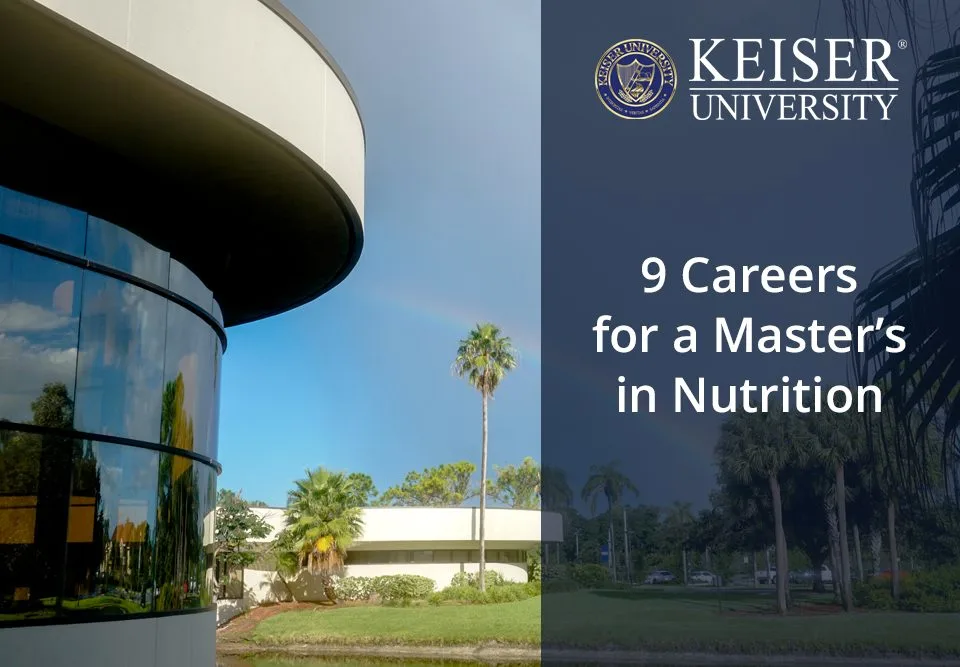A Master of Science in Nutrition is a specialized degree program designed to equip students with the knowledge and skills to assess individual and group nutritional requirements, create nutritious meal plans, and undertake scholarly research. It combines the principles of nutrition science with practical application methods that can be used in medical settings, community environments, private practice for individual or group education & counseling. It provides valuable insight into how nutrition impacts the public health of communities and supports or develops policy towards disease prevention and health promotion.
A master’s in nutrition provides graduates with the tools necessary for a meaningful career assessing the health and well-being of individuals and creating a positive healthy community. Graduates gain the necessary knowledge and skills to advise clients/patients towards a healthier lifestyle including food choices and physical activity. Research studies can also advance the understanding of how nutrition affects health conditions such as diabetes or heart conditions.
Is Nutrition The Career For Me?
Are you looking to turn your passion for nutrition into a career? Becoming a registered dietitian nutritionist (RDN) is a practical career choice for those passionate about health, wellness, and helping others. Nutrition is an interesting field of science exploring how the body processes food and utilizes it for energy. People in this profession work to promote healthy eating habits, develop meal plans and advise their clients on nutritional needs. A nutrition professional usually works one-on-one with clients/patients or with groups to provide educational guidance about balanced diets (meals), food groups, vitamins, minerals, and other topics. It can be gratifying to help people lead healthier lives through proper nutrition. Depending on your level of education and experience, a career in nutrition could mean working in various settings, including hospitals, long-term care, memory care, assisted living or skilled nursing homes, schools, food service, community, government agencies, gyms, or private practice.
Beyond a clinical setting for an RDN, community dietitians work within their communities to improve the health status of the community. Community Dietitians can work for diverse agencies/organizations i.e., federal/state/local agencies, as well as charitable organizations supporting the multiple needs of the community. Community dietitians embrace the uniqueness of the community and center nutritional guidance around ethnicities and ages within the populations being served in the community.
A dietitian nutritionist should be organized, detail-oriented, and able to explain complex topics in simple terms. They should have knowledge of nutrients and food factors such as vitamins, minerals, healthy fats, and unrefined carbohydrates. Strong problem-solving skills are essential to troubleshoot potential nutritional deficiencies or health conditions while keeping the client/patient preferences in mind. Their ability to collaborate with general physicians, and other members of the healthcare team is essential to ensure that patients receive the best care possible. Last but not least, it takes compassionate interpersonal skills to build trust with clients/patients in order for them to put faith in recommended nutritional changes. If you possess all these qualities, becoming a dietitian nutritionist may be the perfect fit for you!
What Is A Master’s In Nutrition?
A Master of Science in Nutrition is a graduate-level program that blends advanced coursework in nutrition science with opportunities for applied learning and research. Students explore how food science impacts health and disease, develop the ability to assess dietary choices and needs, and learn to create evidence-based nutrition plans. The program also emphasizes medical nutrition therapy, community health initiatives, and policy development, ensuring graduates are prepared to guide individuals and groups toward healthier outcomes. Alongside technical knowledge, students build critical thinking, communication, and problem-solving skills that are essential in today’s healthcare and wellness environments.
This degree opens doors to a wide range of industries where nutrition expertise is valued. Many graduates work in healthcare, research, or education, while others find opportunities in clinical settings, corporate wellness, or the food industry. With a strong foundation in both scientific principles and practical application, a master’s in nutrition equips professionals to step into diverse roles that support individual well-being and advance public health.
9 Careers With A Masters In Nutrition
Nutrition is a vital component of a healthy life, and experts in this area can serve the population in meaningful ways. While some of the following professions may require additional education, pursuing a master’s degree in nutrition can be a steppingstone for many career opportunities, including the following:
1. Registered Dietitian
A registered dietitian nutritionist (RDN) is an essential figure in healthcare, as they specialize in nutrition-related Medical Nutrition Therapy, wellness and community strategies for better health. Their guidance can be invaluable in formulating healthy meals, monitoring nutritional intake, and avoiding pitfalls to help individuals achieve overall disease prevention and health promotion. They use their expertise to create meal plans tailored to a person’s lifestyle, culture, income or therapeutic restrictions. Furthermore, they advise on topics such as obesity, diabetes, heart health, and weight management.
A master’s in nutrition is not strictly required in order to become an RDN, but it can deepen your knowledge and expertise. A graduate degree can also differentiate you from other applicants who may only possess a bachelor’s degree.
2. Clinical Registered Dietitian Nutritionist (RDN)
Clinical RDNs specialize in the science of nutrients and their relationship to health. They are educated in using food as a tool for health maintenance, disease prevention, and treatment of chronic diseases. These trained professionals have the skill set to provide counseling on personal eating habits and medical nutrition therapy, determine nutrient requirements, and develop meal plans according to each individual’s unique needs, medical conditions, allergies, and personal preferences. Clinical RDNs are regarded as experts in nutrient metabolism and can identify foods that can impact overall health or complicate certain medical conditions. They keep up to date with emerging research to ensure their clients stay informed and make the best decisions when it comes to their health.
3. Community Registered Dietitian Nutritionist (RDN)
A community RDN provides nutrition guidance and advice to members of their local community. They focus on diet education, meal planning, grocery shopping tips, physical activity program design, and other health-related topics. Their goal is to improve the health of the community by addressing food insecurity and navigate programs from federal, state and local level agencies (WIC, school lunch program, etc.). Although this type of health professional may work for or under the supervision of a doctor, they are medical professionals themselves, whose role is the identification and treatment of nutritional issues from an educational perspective. Community nutritionists help clients make informed decisions to positively impact their overall health through lifestyle changes including healthier meal choices. In addition to nutritious meal planning, community nutritionists may provide baseline assessments to review a client’s current nutrient intake and body composition.
4. Sports Dietitian
A sports dietitian is a trained professional who specializes in developing and implementing nutrition programs for sports teams, athletes and individuals engaged in physical activity. They are responsible for assessing an athlete’s nutritional needs, designing personalized meal plans, and educating athletes about the importance of proper nutrition and hydration. Sports dietitians typically work with athletes at all levels, including recreational, collegiate, and professional athletes. Sports dietitians must have a strong understanding of the relationship between nutrition and physical performance. They must also keep up-to-date with the latest research and trends in sports nutrition to provide the most current and effective advice to their clients.
5. Clinical Trial Administrator
A clinical trial administrator plays a vital role in managing nutrition-related research studies that test new dietary approaches, supplements, or therapeutic interventions. These professionals oversee the day-to-day operations of clinical settings, ensuring that studies run smoothly, meet regulatory requirements, and maintain the highest standards of safety and ethics. Responsibilities often include coordinating participant recruitment, managing study documentation, monitoring data collection, and liaising with research teams, physicians, and regulatory bodies.
With a master’s in nutrition, professionals in this role bring subject-matter expertise to the research setting, helping design protocols that accurately measure the impact of dietary choices on health outcomes. Their ability to interpret results and contribute to scientific publications can also influence future dietary guidelines and inform clinical practice. For those with an interest in research and a detail-oriented approach to project management, this career path offers the chance to advance knowledge in the field while directly supporting innovations in patient care.
6. Nutrition Writer
Nutrition writers specialize in crafting stories and content focused on healthy eating, balanced meals, and physical activity. They may have expertise in nutrition and dietetics, behavioral counseling and culinary arts. Nutrition writers often work to educate their audience through personal experiences written with a helpful, relatable voice. They might research various food trends to write blog posts exploring specific dietary patterns’ health implications. Additionally, they may develop meal plans or recipe ideas while communicating nutrition guidelines from relevant scientific studies or government health organizations. While some nutrition writers focus on writing news-style articles or creating promotional materials for companies selling wellness products, others become health coaches and offer individualized advice for lifestyle changes tailored to meet individual needs. No matter what approach a nutrition writer takes, their goal is often the same: to give readers knowledge and empowerment so that they can make informed decisions about their health and well-being.
7. WIC Nutrition Assistant/Nutritionist
A WIC (Women, Infants, and Children) nutrition assistant or nutritionist supports one of the most widely used federal programs aimed at improving maternal and child health. Professionals in this role provide counseling to expectant mothers, new parents, and young children on topics such as breastfeeding, infant nutrition, and healthy meal planning. They often conduct nutrition assessments, distribute program benefits, and connect families to community resources that address food insecurity and promote long-term wellness.
With the foundation of a master’s in nutrition, WIC nutrition assistants and nutritionists can bring advanced knowledge to program delivery, helping families develop sustainable habits that support growth and development. This career path blends education, counseling, and community health advocacy, making it especially rewarding for those who want to use their expertise to strengthen the health of vulnerable populations.
8. Food Scientist
Food scientists and food technologists work to ensure that the foods we eat are safe, nutritious, and appealing. These professionals apply food science and technical knowledge to the study, creation, and improvement of food products. They often focus on research, analyzing food composition, testing for contaminants, and developing ways to preserve nutritional value while maintaining safety and flavor. Their work helps ensure compliance with regulatory standards and supports innovation in product development.
Food technologists take this knowledge further into practical application, transforming raw ingredients into market-ready foods. They may develop recipes, test ingredient combinations, and oversee quality control throughout production processes. In addition, they are often involved in packaging, storage, and supply chain decisions to ensure that food remains safe and consistent from factory to consumer. Together, food scientists and food technologists play a critical role in shaping the food industry — balancing safety, nutrition, and consumer satisfaction while driving forward innovation in how we produce and consume food.
9. Nutrition Educator
Nutrition educators focus on teaching individuals and groups how to make healthier food choices and understand the role of nutrition in overall well-being. They often work in schools, community centers, healthcare organizations, or government programs, delivering workshops, creating educational materials, and providing guidance tailored to different age groups and populations. Their work may include developing lesson plans for children, leading wellness seminars for adults, or supporting public health campaigns that encourage balanced diets and active lifestyles.
With a master’s in nutrition, educators bring advanced knowledge to their teaching, ensuring that information is accurate, evidence-based, and aligned with current dietary guidelines. Beyond sharing facts, they also empower people to apply nutrition concepts in their daily lives — whether that means learning how to shop on a budget, prepare healthier meals, or recognize the link between diet and chronic disease prevention. For those passionate about communication and outreach, this career path offers the chance to influence positive change at both the individual and community level.
Grow Your Nutrition Career with Keiser
If any of these career paths inspire you, Keiser University can help you take the next step. Our Master of Science in Nutrition Innovative Leadership and Master of Science in Clinical Nutrition Coordinated Program provide the advanced education and credentials needed to excel in roles ranging from healthcare and government agencies to food service management in schools, hospitals, and community organizations. These programs are designed to prepare graduates with the knowledge and skills to succeed in today’s evolving nutrition and health fields. To learn more about Keiser University’s accredited, 100% online master’s degree programs and how they prepare students to become registered dietitian nutritionists, contact a Graduate Admissions Counselor today.






 The instructors at Keiser University impacted my life. They believed in my ability to become a great graphic designer, regardless of how I felt about my skills. KU helped to prepare me for the real world and got me to where I am today.
The instructors at Keiser University impacted my life. They believed in my ability to become a great graphic designer, regardless of how I felt about my skills. KU helped to prepare me for the real world and got me to where I am today.
